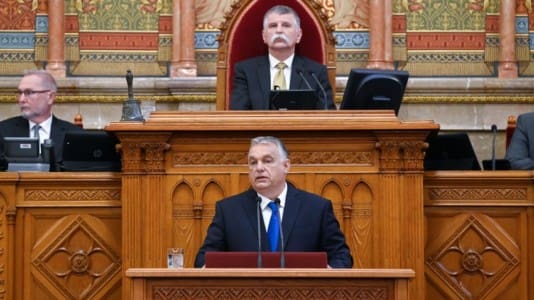Päivi Maria Räsänen, the former interior minister of Finland and current member of parliament, recently made headlines across the world when news broke that she won a landmark free speech court case in Finland. However, the reality is that her case is far from over. An aggressive prosecutor has appealed the case, and continues to contend that her use of Bible verses on the topic of LGBT people is a hate crime.
Räsänen, who is a devout Christian, told Remix News that she has a deep conviction that the trial is in God’s hands, and has served as a calling for her.
This interview had been edited for clarity.
You won the first trial at the end of March with a not-guilty verdict. What was your immediate emotion after you had time to process your court victory?
I have to say that I was very relieved and happy for the victory. The verdict was very important for freedom of speech and religion in Finland, and of course, for myself. It was a very long process, lasting almost three years, including all the police investigations and interrogations and so on. So, it took a lot of my time and energy. I’m also very happy that the three judges made a unanimous decision, which sent a strong message.
I’m also pleased because the court stated very clearly that some of the accusations made by the prosecutor were simply not true, because during this trial, perhaps the most difficult element for me was that they claimed I made statements where I never said anything like that, and it feels incredibly unfair to be accused of something that you have never said.
The prosecutor has appealed the case. What are your feelings about going back to trial?
I have a calm mind about it. I am convinced that the whole process is in the hands of God. If I get the acquittal in the appeal court or in the Supreme Court, the case would gain the status of a positive precedent for freedom of speech and religion. And the trials will give more opportunities for me to present the message of the Bible and speak about the gospel in public.
The first trial lasted almost three years. How long do you expect this first round of appeals to last?
I suppose the whole process will perhaps take at least one year or even some more years.
Do you think your case will make it to the Finnish Supreme Court at some point?
I think that it’s very likely it also comes before the Supreme Court. This is some sort of mission for the prosecutor. She wants to fight against hate speech, and she has claimed that my Biblical views, for example, about the concept of sin, is hate speech against a minority. So, the trial has been very absurd and unusual. It has never happened before in Finland that someone could be brought to trial over their Biblical beliefs.
Almost the entire time we were discussing about the Bible, what the Bible says about marriage and sexuality and sin, and so on. During the trial, she said that my doctrine, my Christian doctrine, could be summarized as “Hate the sin, but love the sinner.” And she said that this doctrine in itself is insulting, although I have said all the time that we all are sinners, and that sin is only a matter between God and man. It is not about our society. It is a theological concept that we are sinners in front of God, and that’s why we need Jesus and salvation. But I have to say that the whole process has been so absurd because it has been about the deep concepts of Christianity.
[pp id=32814]
You said that the prosecutor made up false claims about you. Can you provide an example of that?
Yes, there were several examples of this. First, she claims that I had said that God had not even created homosexuals. Of course, I have not said that. I have always said, also in the pamphlet [I published], that God has created all people, and we are all equal because we are created in the image of God, and that means all people, also homosexual people as well as heterosexuals. We all have equal dignity before God.
[The prosecutor] also claimed that I have said that homosexual people are inferior compared to other people. I have never said anything like that.
Then, there was also a claim that I had said that homosexuality is a genetic degeneration. I have never said anything like that. On the contrary, I said in the radio program that the latest research shows the genetic component is a very small element in the origin of homosexuality. So, I don’t even think that homosexuality has a genetic origin.
And then there was also an accusation that I had said that homosexuals are also pedophiles. I have never said that, and I don’t believe that. So, there were several false claims.
Would it be illegal to say that gay people are inferior in Finland? In the United States, for example, this would be obscene but likely protected speech.
Yes, that would be illegal, because in Finnish law, we have laws against “agitation against a minority group,” and if you say that gay people are inferior to other people, or if you compare them to animals or or say that they are criminals or something like that, then it is illegal. But I have never said anything like that.
[pp id=27220]
So, you’re saying the prosecutor is outright lying about what you said?
Yes, I think they are lies. I was happy that the court stated clearly that I have not said these things.
Are you considering legal action against the prosecutor?
Yes, perhaps later when this process is over, Then, I will think about it because the prosecutor defends herself by saying that she has done only an objective interpretation of my statements, but they are false interpretations. because in fact these statements are against my convictions.
There has been a lot of discussion in Finnish society now after the verdict because now the media has also understood that they were false accusations.
What was the effect on your reputation, your family and your finances due to this trial?
The most difficult aspect in this process has been the effect on my reputation, because it has been so difficult to fight against these false accusations, and it would be easier to defend yourself if we were operating with the same facts, but when you have different texts, it is more difficult.
In general, I have felt a strong conviction that there has been some purpose in this process, and I think that this has been some kind of calling for me. So, I think that in some way it has been an honor to defend freedom of speech and freedom of religion in Finland, and I think that there was a need for this kind of discussion in Finnish society.
As a Christian, this trial has also opened up many possibilities and many opportunities to speak about important issues, about the Bible and about Jesus, because we have this solution to the problem of sin in Jesus, who has forgiven our sins. This has been a joy for me to tell about the good news of the Bible, and the Gospel many times in Finnish media, to the police, and in front of the court. So, I have a strong conviction that everything that has happened has all has been in God’s hands.
Regarding my family, my family has supported me all the time — my husband and my grown-up children with their families. So they have been very, very important and strong supporters for me.
This is not a cheap process because it has also come with quite heavy financial costs. Altogether, it may cost hundreds of thousands of euros if the whole process goes to the end, including to the Supreme Court and later the European Court of Human Rights. It would equal about €300,000 so, I’m happy that all my children have told me to stay strong, and my whole family is ready also for the consequences of this case.
[pp id=36021]
We do have some funding. In Finland, we have an organization that is supporting freedom of speech and religion. It was founded last summer. And there have been many people who have wanted to financially support this process and also the international legal organization ADF [Alliance Defending Freedom] is supporting us and giving us legal advice.
The case has received a lot of international media attention, including from the English-speaking press, despite being a Finnish court battle. How do you feel about the international scope of the trial?
It has been a very big surprise for me. I didn’t expect this kind of attention for this case, but Finland has a very good reputation regarding its legal system and rule of law, and many Christians in other countries say they think that if something like this can happen in Finland, it can happen in any country.
I think that this is not only about me and my case, it is about the freedom of religion in other European countries, the Western world, and even all post-Christian countries. We have similar kinds of challenges now. For example, the LGBTQ lobby is very aggressive in many countries, and they have international networks. So, we are living out some kind of battle between Christian values and secular values, and I think that this is the reason for the huge international interest in this case.
What is the current state of Christianity in Finland?
In Finland, we have a big Lutheran state church, which 70 percent of our population belongs to. I am myself also a member of it and my husband is a pastor in the Finnish Lutheran Church, so I know this church very well. In fact, when I was a minister in our government, I was in charge of the interior ministry, but I was also in charge of church affairs.
In only two or three decades, there was a very big change in the beliefs of our population, so that nowadays, even though a majority of people belong to the Church, only a small minority of people actually believe in the doctrines of the Christian Church. We have also seen this development in the research on the subject.
In addition, the leadership of the Finnish church has a very liberal and progressive mindset. So, we have pastors and bishops who married same-sex couples, even though it is not the official doctrine of the Church. Now, we have a big battle going on inside the Finnish Lutheran Church, but within the Finnish church system, we also have many Bible-based organizations, missions, revival movements, and also of course, we have other churches, such as Orthodox, Pentecostal, Baptist churches, and so on. So, there are also many churches and Christians who are worried about the development of the Church and who are very strongly supporting me and my views.
You say the the leadership of Finnish Lutheran Church is quite liberal, but what about the Finnish Supreme Court? Does it have a liberal reputation or conservative reputation, or is it very unclear?
I would say that in Finland it is unclear. We don’t know because in Finland we have a different system than in, for example, the United States. The judges here are not nominated by political parties. They are nominated by our president, but not in a similar way as, for example, in the United States, so I don’t know how they lean, and I think that nobody knows.
But what we do know is that our prosecutor general is very liberal-minded. She has stated and declared her views in various texts.





